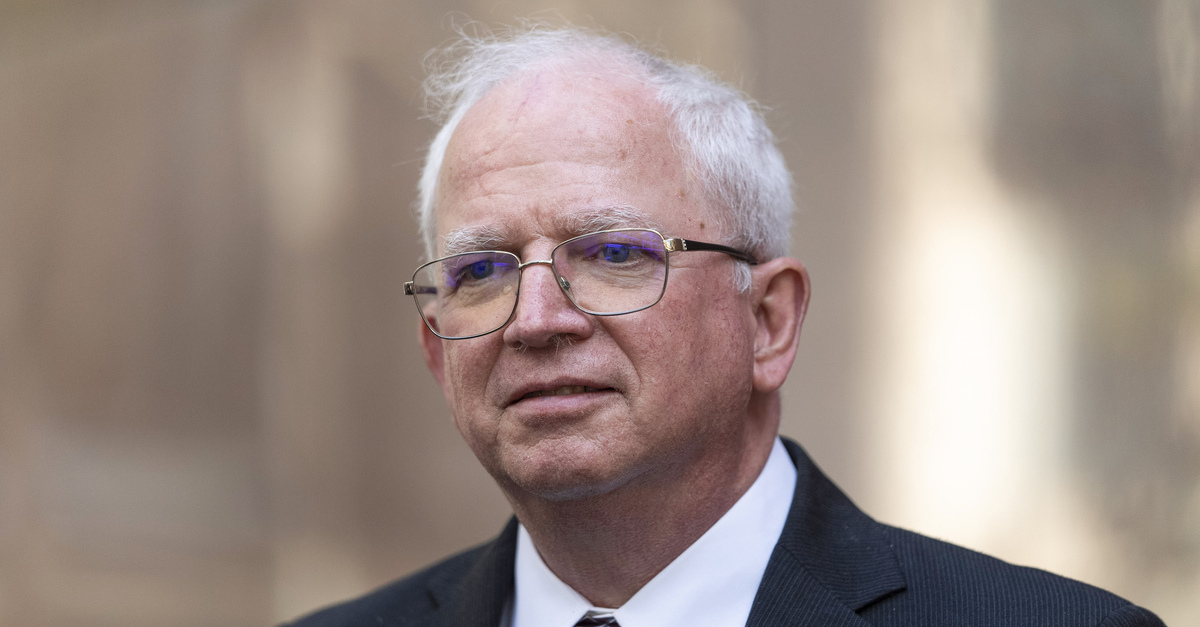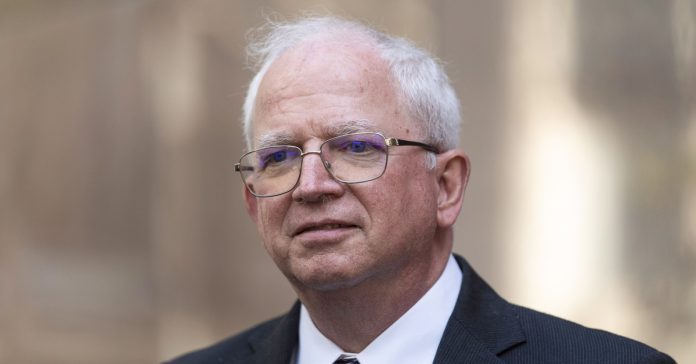
Attorney John Eastman, the architect of a legal strategy aimed at keeping former President Donald Trump in power, talks to reporters after a hearing in Los Angeles, June 20, 2023. (AP Photo/Jae C. Hong, File)
The judge overseeing conservative attorney John Eastman’s ethics trial issued a ruling of preliminary culpability on Thursday that could result in his disbarment in California.
Eastman was a key architect of former president Donald Trump’s efforts to overturn the results of the 2020 election – infamously authoring two of many so-called “coup memos.” Those memos variously advised on potential scenarios under which President Joe Biden’s electoral college victory could be set aside.
Numerous groups would go on to file ethics complaints over Eastman’s role in those failed anti-democratic plans with the State Bar of California, a regulatory agency that oversees attorney licensing and discipline in the Golden State. In March 2022, an investigation into those allegations began. In late January, the oversight agency charged Eastman with 11 disciplinary charges, which included “false and misleading statements” alleging fraud during the 2020 election.
The pro-Trump attorney’s trial began in June. The trial was briefly paused due to scheduling issues because the proceedings took much longer than initially anticipated and resumed in late August.
On Thursday, California State Bar Court Judge Yvette D. Roland issued “a preliminary finding of culpability” and said the case would “move forward with not only rebuttal testimony but aggravation,” according to a courtroom report by Bloomberg Law.
That preliminary finding was issued verbally from the bench. A written order summarizing those findings has not been filed.
The States United Democracy Center, one of the organizations that filed a bar complaint against Eastman, hailed the judge’s preliminary finding, calling it “a major milestone in the State Bar’s pursuit of accountability.”
The group describes itself as nonpartisan and was founded by the partner of Massachusetts’ current Democratic governor, a former member of the Obama White House, and a former Republican governor of New Jersey.
“Lawyers swear an oath to uphold the Constitution and the rule of law,” spokesperson Christine P. Sun said in a press release. “John Eastman not only violated that oath, he did so with enormous consequences for our democracy. He should no longer be allowed to practice law.”
The state bar itself offered a more cautious appraisal of the judge’s preliminary order.
“It is common for parties to a disciplinary proceeding to request that the court permit a witness during a trial’s culpability phase to also offer evidence on aggravation or mitigation so the witness does not have to return to court a second time,” the Office of Chief Trial Counsel (OCTC) told Law&Crime. “When permission is not granted, a tentative finding on culpability is required before OCTC can present evidence in aggravation. From OCTC’s perspective, the significance of yesterday’s tentative ruling on culpability is that it allows OCTC to present evidence on aggravation.”
In a minute order obtained by Law&Crime, the court set the final trial date for Friday. During closing arguments, Eastman will be allowed to present rebuttal evidence while state bar counsel will make the case for why the attorney’s California law license should be revoked.
Once the trial formally concludes, a lengthy follow-up process will likely preclude a final say on the matter for quite some time.
The parties will submit a post-trial brief on Nov. 22.
Meanwhile, the judge will have 90 days from the final day of testimony to issue a final ruling, including the appropriate sanction – if any. That final decision, however, can be appealed.
Throughout the proceedings, the state bar called elections experts, including Democratic and Republican officials, who testified that the 2020 election was fair and that ballots were counted accurately.
Eastman argued a point cumulative to what he had already expressed in his public statements and legal analyses. That is, the attorney said his disbarment proceedings had only strengthened his belief that the 2020 election was marred by fraud.
The heart of Eastman’s theory was that then-Vice President Mike Pence could stop the counting of Electoral College votes on Jan. 6, 2021. At the same time, Republican-controlled state legislatures could create and send groups of so-called “contingent electors” who were committed to voting for Trump in states that were won by Biden, citing alleged fraud. Such fraud, of course, was never proven.
During his testimony, Eastman insisted he never provided the memos to Trump personally and that he simply advised the then-president to push Pence to delay the Jan. 6 proceedings.
On Friday, an expert for the state called as a rebuttal witness reiterated that there was “no evidence” to support the claim that fraudulent ballots had been cast in Biden’s favor in Michigan.
Earlier in the trial, one of the experts called by Eastman himself testified that Biden won “fair and square,” and there was no legitimate dispute about the validity of such wins for Pence to weigh in on.
Since the ethics trial began, Eastman was criminally charged in Georgia with nine counts over his participation in an alleged criminal conspiracy to overturn the 2020 election results with 18 other co-defendants, including Trump, in a 41-count criminal indictment.
Have a tip we should know? [email protected]

